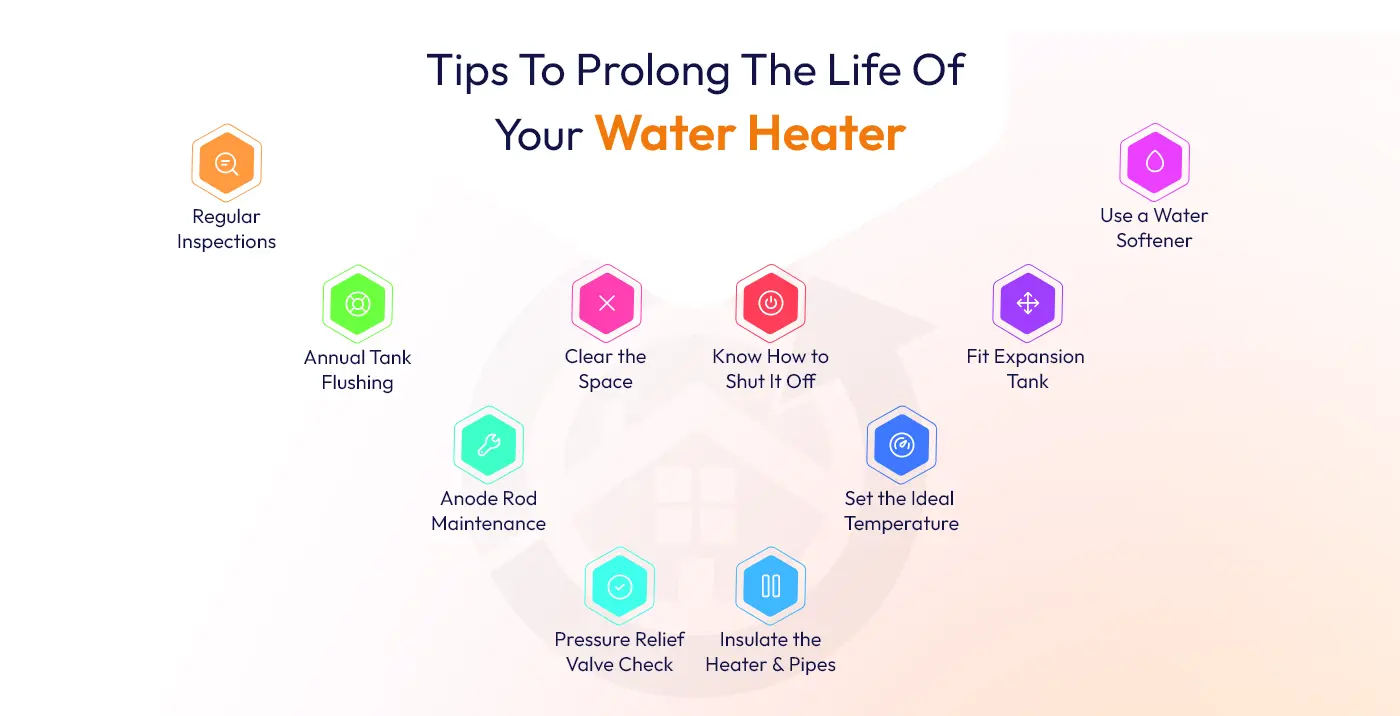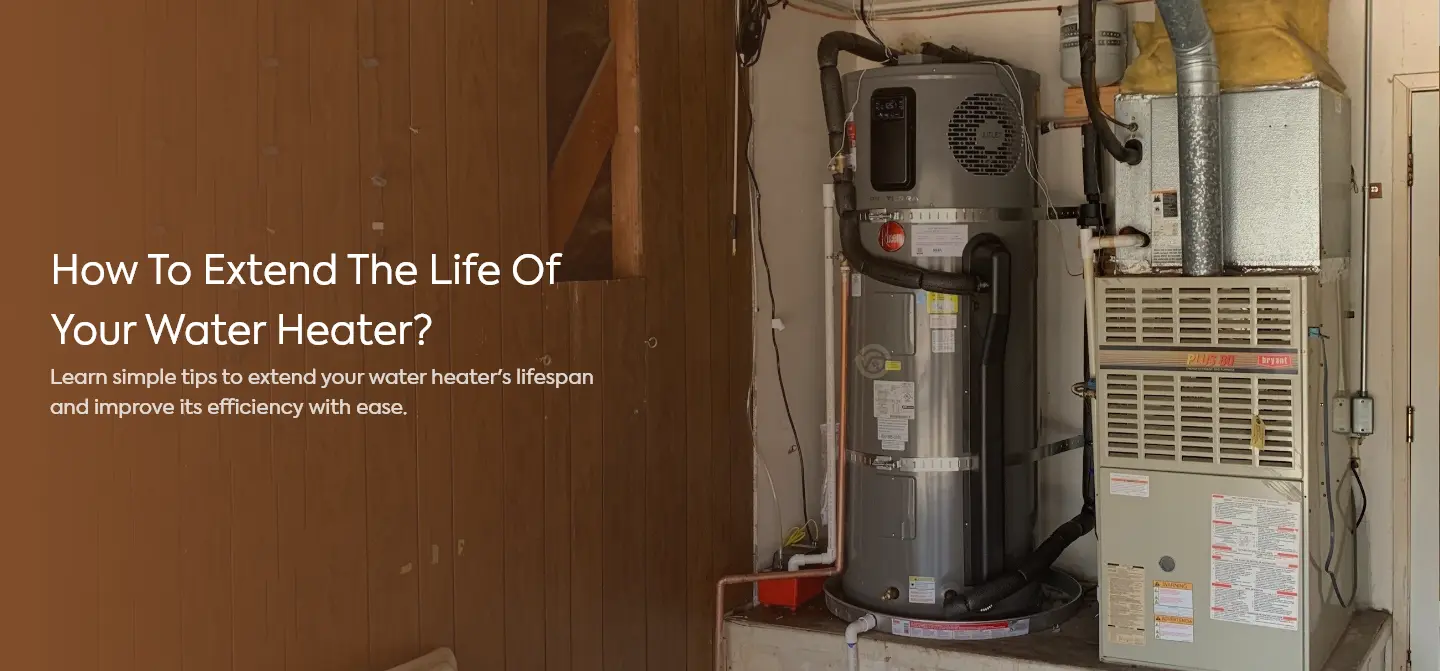A water heater is one of those appliances you probably never think about much until it stops working. It’s one of the silently indispensable household appliances serving to provide hot water for showering, washing and doing laundry, and dishwashing; though they usually last up to 8 to 12 years, some effort can go a long way toward keeping them running efficiently for longer time spans.
Here is a simple guide to help extend the life of your water heater.

1. Schedule Regular Maintenance
Check-up inspections will help identify problems before they become costly breakdowns. Here are some maintenance tips:
Inspect It Yourself: Take a gander around the water heater tank and surrounding pipes. Look for leaks, cracks, or rust. If you find anything concerning, address it promptly.
Call in the Experts: Hire a professional to annually check your water heater. They can find problems that may be invisible to you.
2. Flush the Tank Once a Year
Sediment indeed collects at the bottom of the tank over time; this can damage the tank and reduce its efficiency. Flushing the tank annually will help to prevent it from building up. Here’ show:
- Disconnect the power supply (gas or electric) to the heater.
- Shut off the cold-water valve.
- Turn on the hot water faucet to release pressure.
- Attach a hose to the drain valve, directing the other end to a drain.
- Open the drain valve and drain the tank to its complete emptying state.
- Close the valve, refill the tank, and observe water flow steadily from the hot-water faucet.
3. Check and Replace the Anode Rod
The anode rod is another essential protection element for your tank as it prevents rusting. It attracts corrosive elements found in water, thus allegedly “sacrificing” itself in place of your tank. Check it every year and replace it every 3-5 years or when it appears rather corroded.
4. Check the Pressure Relief Valve
The pressure relief valve keeps your water heater safe by releasing excess pressure. Test it by lifting its lever. If water flows out, it’s okay. If it does not or leaks afterward, replace it.
5. Add Insulation
Improve your water heater’s efficiency by wrapping it in insulation. This minimizes heat loss, reduces energy use, and lessens wear and tear. Don’t forget to insulate the first few feet of hot and cold water pipes too.
6. Set the Right Temperature
High temperatures put your water heater under a lot of stress. Setting it around 120° F or 49° C is sufficient for most household applications and also prevents scalding while helping conserve energy.
7. Consider an Expansion Tank
If your water pressure is on the higher side or temperature fluctuations are frequent, installing an expansion tank can be beneficial. The expansion tank sucks in the extra pressure due to thermal expansion, thus helping reduce stress on your water heater.
8. Combat Hard Water with a Water Softener
Mineral build-up from hard water can be quite detrimental to your heater’s functioning as well as its lifespan. Installing a water softener can thus significantly reduce the potentiality of such malfunction and shorten lifespan.
9. Clear the Space Around the Heater
Remove any clutter or flammable materials around your water heater. This allows for good air circulation, reduces fire hazards, and assists during maintenance.
10. Know How to Turn It Off
In case of emergencies, know how to turn off your water heater. Identify the power supply switch either electric or gas, and locate the shut-off valve for cold water in case something goes wrong.
Conclusion
Maintaining these simple tips will help extend the life of your water heater, so you don’t end up wasting money on repair and replacement. These regular checks, proper temperature settings, and other periodic maintenance works such as flushing the tank and replacing the anode rod can prevent expensive repair jobs or premature replacements. Proper care for your water heater will improve its performance, as well as the overall efficiency of your home’s hot water system. After all, a properly maintained water heater is a worthwhile investment that really yields reliable service and lower energy bills for years.
It’s a good idea to flush your water heater once a year. This helps remove any sediment build-up that can make it less efficient and may damage the tank.
The anode rod helps prevent your water heater from rusting by attracting harmful minerals. You should check it every year and replace it every 3-5 years or when it’s worn out.
You can test it by lifting the lever. If water comes out, it’s working fine. If nothing comes out or it leaks afterward, it may need to be replaced.
It’s best to set your water heater to around 120°F (49°C). This is hot enough for daily tasks and helps save energy while preventing scalding.
Yes! Hard water can cause mineral build-up in your water heater, which makes it work harder and shortens its life. A water softener helps reduce these minerals and can keep your heater running smoothly for longer.






